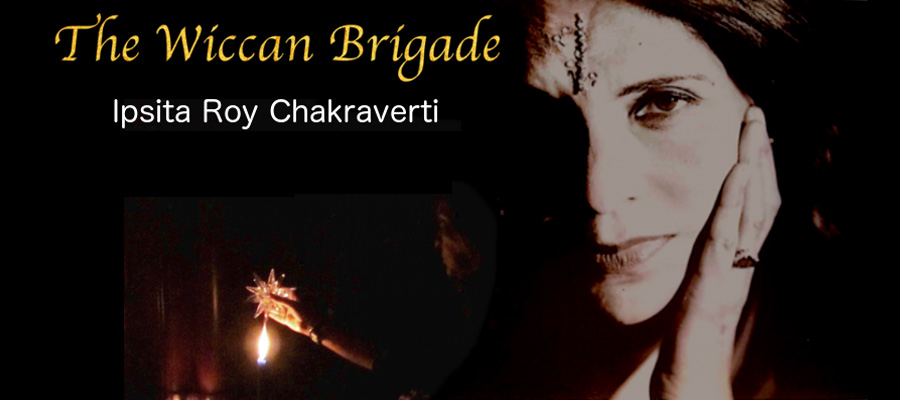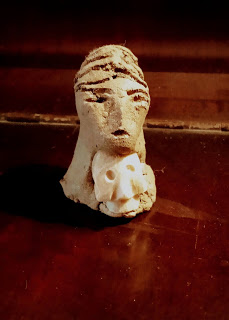


Also known as: Ishtar, closely associated with Nanaya, Ninsianna
Pray to her for :Strength, victory, love, magical success, fame, well-being, overcoming opposition
Invoke her with : A blue stone , like lapis lazuli or dark iolite

(Hand crafted by Deepta. Inspired by the hymn, The Exaltation of Inanna, the Goddess is shown as the devourer of corpses.)
Inanna combines within her many aspects, both light and dark. She is the goddess of love and sexuality. She can be a seductive enchantress, a sorceress and stand independent. She will have love and desire-but on her own terms. Another aspect of the goddess shows her as a warrior who strides out and destroys all opposition, giving her worshipper victory. She gives power and success in the face of tremendous enmity. And in her third aspect, Inanna is also known as Venus, the morning and evening star. She can give well-being, fame and happiness.
It is through the bringing together of these various aspects, that Inanna has been seen as the complete goddess, and the complete woman.
Depictions of Inanna have varied from region to region. She is usually shown with the horned cap of divinity. As a warrior goddess, weapons are shown coming out of her shoulders and held in her hand. A beard is often shown to emphasize her masculine and aggressive manifestation. She is often shown with one foot on a lion. As a goddess of love and sexuality, she is often depicted nude. Some images show her holding an open cape. In astral imagery, she is shown as an eight pointed star. Lapis lazuli and carnelian are both closely associated with Inanna.
Invocations to Inanna
The Exaltation of Inanna
(Composed by the high priestess and princess Enheduanna)
Lady of all the divine powers, resplendent light, righteous woman clothed in radiance, beloved of An and Urac! Mistress of heaven, with the great pectoral jewels, who loves the good headdress befitting the office of en priestess, who has seized all seven of its divine powers! My lady, you are the guardian of the great divine powers! You have taken up the divine powers, you have hung the divine powers from your hand. You have gathered up the divine powers, you have clasped the divine powers to your breast. Like a dragon you have deposited venom on the foreign lands. When like Ickur you roar at the earth, no vegetation can stand up to you. As a flood descending upon those foreign lands, powerful one of heaven and earth, you are their Inanna.
Raining blazing fire down upon the Land, endowed with divine powers by An, lady who rides upon a beast, whose words are spoken at the holy command of An! The great rites are yours: who can fathom them? Destroyer of the foreign lands, you confer strength on the storm. Beloved of Enlil, you have made awesome terror weigh upon the Land. You stand at the service of An's commands.
At your battle-cry, my lady, the foreign lands bow low. When humanity comes before you in awed silence at the terrifying radiance and tempest, you grasp the most terrible of all the divine powers. Because of you, the threshold of tears is opened, and people walk along the path of the house of great lamentations. In the van of battle, all is struck down before you. With your strength, my lady, teeth can crush flint. You charge forward like a charging storm. You roar with the roaring storm, you continually thunder with Ickur. You spread exhaustion with the storm-winds, while your own feet remain tireless. With the lamenting balaj, drum a lament is struck up.
My lady, the great Anuna gods fly from you to the ruin mounds like scudding bats. They dare not stand before your terrible gaze. They dare not confront your terrible countenance. Who can cool your raging heart? Your malevolent anger is too great to cool. Lady, can your mood be soothed? Lady, can your heart be gladdened? Eldest daughter of Suen, your rage cannot be cooled!
Lady supreme over the foreign lands, who can take anything from your province? Once you have extended your province over the hills, vegetation there is ruined. Their great gateways are set afire. Blood is poured into their rivers because of you, and their people must drink it. They must lead their troops captive before you, all together. They must scatter their élite regiments for you, all together. They must stand their able-bodied young men at your service, all together. Tempests have filled the dancing-places of their cities. They drive their young men before you as prisoners. Your holy command has been spoken over the city which has not declared "The foreign lands are yours!", wherever they have not declared "It is your own father's!"; and it is brought back under your feet. Responsible care is removed from its sheepfolds. Its woman no longer speaks affectionately with her husband; at dead of night she no longer takes counsel with him, and she no longer reveals to him the pure thoughts of her heart. Impetuous wild cow, great daughter of Suen, lady greater than An, who can take anything from your province?
Great queen of queens, issue of a holy womb for righteous divine powers, greater than your own mother, wise and sage, lady of all the foreign lands, life-force of the teeming people: I will recite your holy song! True goddess fit for divine powers, your splendid utterances are magnificent. Deep-hearted, good woman with a radiant heart, I will enumerate your divine powers for you!
References
1. Mercer, Samuel A.B. "The Malediction in Cuneiform Inscriptions." Journal of the American Oriental Society 34 (1915)
2. Dhwty. “Nammu: A Forgotten Tale of the Sumerian Mother of Gods.”. Ancient Origins: Reconstructing the story of Humanity’s Past,
3. Hallo, William W. The Book of the People. Providence RI 02912: Brown Judaic Studies, Brown University. 2020.
4. Black, Jeremy. Gods, Demons and Symbols of Ancient Mesopotamia: An Illustrated Dictionary. 2014
6. Price, Ira M. “The Oath in Court Procedures in Early Babylonia and the Old Testament”. Journal of the American Oriental Society 49(1929)
7. Bock, Barbara. The Healing Goddess Gula: Towards an Understanding of Healing Babylonian Medicine. 2014
8. Alvarez-Mon, Javier. The Art of Elam: Routledge
9. Wiseman, D.J. “The Goddess Lama at Ur”. Iraq 22(1-2), ‘Ur in Retrospect: In memory of Sir C. Leonard Woolley’ pp 166-171. 1960
10. De Shong Meador, Betty. “Enheduanna: The First Known Author”. American Translators Association Publication. June 27,2017.
11. Ornan, Talley. “The triumph of the symbol: Pictorial representation of deities in Mesopotamia and the biblical image ban”. University of Zurich, 2005.
12. Koch, Heidemarie. “Theology and Worship in Achaemenid Iran”. Religion and Science, 1995
13. Ford, Michael. Maskim Hul: Babylonian Magick. 2010.
14. Jordan, Michael. Dictionary of Gods and Goddesses. New York: 1993,2004
15. Folz, Richard. Iran in World History. United States of America, 2016
16. Mark, Joshua. “The Myth of Etana”. Ancient History Encyclopedia.
17. Abusch, Tzvi and Karel Van der Toorn. Mesopotamian Magic: Textual, Historical and Interpretative Perspectives.
18. Hurwitz, Siegmund, Lilith, the first Eve: Historical and Psychological Aspects of the Dark Feminine.
19. Koch-Westenholz, Ulla. Mesopotamian Astrology: An Introduction to Babylonian and Assyrian Celestial Division. University of Copenhagen
20. Sjoberg, Ake W. “Hymn to Inanna and Her Self Praise”, Journal of Cuneiform Studies, Volume 40 Number 2.
21. Guterbock, Hans Gustav. “An Addition to the Prayer of Muršili to the Sungoddess and Its Implications”. Anatolian Studies, Volume 30, 1980.
22. Sassmannshausen, Leonard ed. He has Opened Nisaba’s House of Learning:
23. Norrie, Philip. History of Disease in Ancient Times: More Lethal Than War, 2018.
24. Mullo-Weir, C.J. Rev. “Four Hymns to Gula”, Journal of the Royal Asiatic Society, Part 1 – January, 1929
25. Blasweiler, Joost. “The Kalehisar Mountain and the deities of Arinna, the city of the Sun Goddess” Academia.Edu,
26. Scurlock, JoAnn, and Burton R. Andersen. Diagnoses in Assyrian and Babylonian Medicine: Ancient Sources, Translations, and Modern Medical Analyses. University of Illinois
27. Langdon, Stephen Herbert. Sumerian Liturgies and Psalms. United States of America: Library of Alexandria, 1919
28. Gabolde, Marc Dr. “The End of the Amarna Period”, BBC History, February 17, 2011,
29. Houwink, H.J. Ph. “Hittite Royal Prayers”, Brill Online Publication, Volume 16, Issue 1, 1st January, 1969
30. “Ancient Mesopotamian Gods and Goddesses”, Oracc and UK Higher Education Academy,
31. Dassow, Eva Von, Dr. “Contagion and Recovery in the Ancient Hittite Empire”,
32. Mark, Joshua J. “Ancient History Encyclopedia”, Ancient History Encyclopedia.